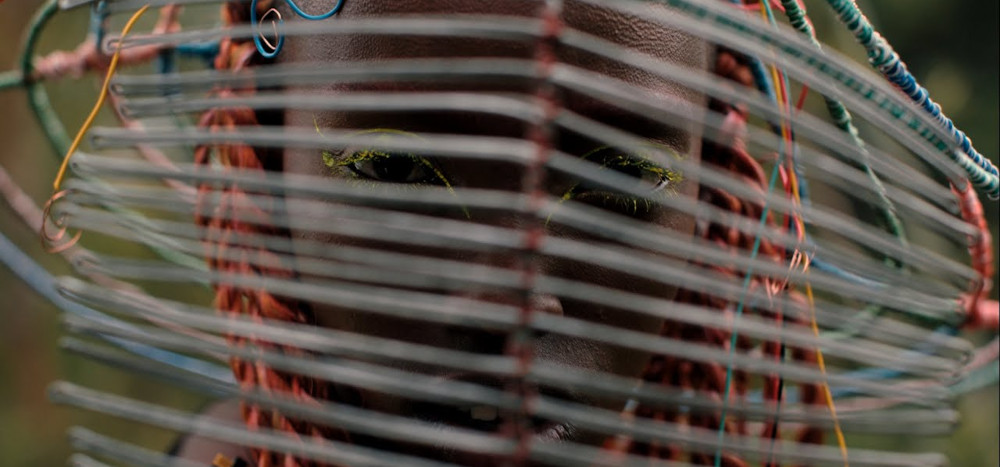
Regienotizen zu „Neptune Frost“
I began working on this project in 2013 as a graphic novel and a musical. I wanted to center mywriting around the social and global issues flooding my actual and virtual timelines and theircountless intersections through a story, character, and project that would allow me to focus all ofmy observations, insights, rants, and talents under one heading: The MartyrLoserKing project,which has three albums, a graphic novel (01First Second Books), and the film: NEPTUNE FROST.
We put our energy into everything we touch, everything we focus on, and maybe even into thethings we ignore, but conscious energy is an investment. It’s what some mean when they type“thoughts and prayers.” Many artists embed and charge their creations with „thoughts andprayers“, an energy you feel when it reaches you. Maybe it unlocks something. Perhaps it’s thesincerity of the artist emitting a frequency that couples with our own to heal or release themoment. Maybe the beat or melody offers something unsaid, a sensation we never knew we hador needed touched. Maybe it does nothing, just like typing “thoughts and prayers,“ but that dataholds space. It holds the space for us to be moved beyond convention, to experience and explorenew stories, maybe even other forms of storytelling.
NEPTUNE FROST is a story that demystifies the connection, that highlights technology asawareness, that shatters convention and honors the means through which this conversation istaking place.
How many longwinded pitches would it take to convince large-scale investors that a story thattakes place in a little-known country, with rebellious and anti-establishment themes, and drawsinspiration from many socio-political movements happening today, should be left in the hands of apoet? A poet who isn’t interested in making films by committee, who has more critical acclaim thansales, who has never directed a film, who dreams to “spark the brain that will change the world.” Apoet who thinks the formulaic aesthetic that births reality stars and super-heroes alike takes itscues from a cultural mythos that is more invested in the bottom line than illuminating the rut at thebottom, who thinks the bottom is the top, who sees each high-priced tick in the stock market inassociation with the African country where the commodity is sourced then marks its ranking on thelist of poorest nations, who thinks: “Wait a minute. If it’s that rich in resources, then how…” But who knows the answer, who sees how power corrupts and obstructs, who isn’t interested in disaster and poverty porn, who thinks it’s a kind of colonial projection when dreamsof distant galaxies are embedded with fears of being colonized by aliens, who thinks the internet,like poetry, is undefeated, who thinks the job of the poet is to decode, who calculates algorithmicswagger by those who don’t follow, who knows the connection was there before the machine, whohas never truly danced in a movie theater and thinks it’s a shame, who knows each rhythm tells astory, who has a story to tell…
Writing the music has written the story. My love of music and theater are as separate as they aretogether, but musical theater in film and on stage has left its mark on me. I went to see Sarafinaon Broadway seven times. The mix of raw politics, story-telling and music was everything, Thoseactors risked being exiled from their country and separated from their families for daring toperform truth to power. I was transfixed. I began writing my first musical for film when I wassixteen and living in Brazil as an exchange student. It was actually a mix-tape musical, ‚though Ireferred to it as a „hipopera“. Corny, I know, but I was sixteen. The MartyrLoserKing project hasthree albums (MartyrLoserKing : Neptune Frost : Unanimous Goldmine). Each album containssongs from and inspired by the musical. The graphic novel is from the perspective of the coltanminer, The film is from the perspective of Neptune. OK, enough already. Maya Angelou once saidthat anything an artist writes should be written with the urgency of what they would write ifsomeone were holding a gun in their mouth. The state of this country and the world has my mouthpropped open enough to swallow whole timelines. We need art that is unafraid to challenge thenarrative structure of our programming. Computational propaganda circulates at the speed ofcolonial diseases through indigenous populations. Music is a time-machine.
This project wouldn’t be shit without the music. Music is the door hidden within each door. It’s howI met Stephen Hendel, producer of FELA!, with whom we’ve teamed since the beginning, soon joined by Lin Manuel Miranda amongst others and finally QUIET to make sure this film got madewith an entirely Rwandan and Burundian cast and crew.
I’m excited to finally be at the point of sharing more of the story with you.
Saul Williams
